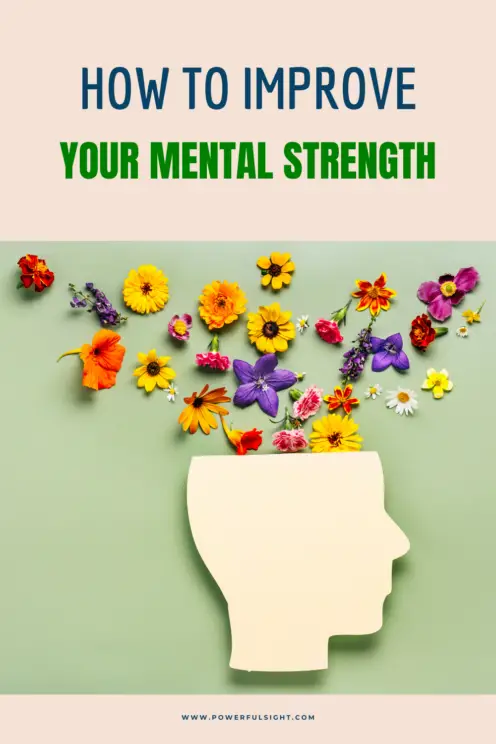Do you ever wonder how some people seem to handle life’s challenges with ease, while others crumble under the weight of even the smallest setbacks? The secret lies in mental strength. Being mentally strong doesn’t mean you never experience negative emotions or face obstacles; it means you have the resilience and mindset to navigate through them effectively. Continue reading to discover tips on how to become mentally strong to overcome all the challenges of life.
What does it mean to have Mental Strength?
Mental strength is the ability to adapt, persevere, and bounce back from adversity. It involves developing a mindset that allows you to face challenges head-on, rather than being overwhelmed by them. Mental strength is not something you’re born with; it can be cultivated through practice and intentional efforts.
The Importance of Mental Strength
Mental strength is crucial for personal growth and success. It allows you to overcome obstacles, maintain focus, and achieve your goals. Without mental strength, setbacks can easily derail your progress and leave you feeling defeated. On the other hand, a strong mindset empowers you to face challenges with confidence and resilience. By developing mental strength, you can enhance your overall well-being, excel in your career, and cultivate healthy relationships.
Mentally strong individuals are more likely to persevere through difficult times and maintain a positive outlook. They possess the ability to regulate their emotions, adapt to change, and effectively manage stress. Mental strength is not only beneficial for dealing with setbacks; it also enables you to embrace opportunities and thrive in uncertain situations.
Characteristics of Mentally Strong Individuals
Mentally strong individuals possess certain characteristics that set them apart from others. They have a growth mindset, which means they believe their abilities can be developed through dedication and hard work. They are self-aware and able to recognize their strengths and weaknesses. Not only that but mentally strong individuals are resilient, adaptable, and have a strong sense of purpose.
These individuals have strong emotional intelligence, allowing them to understand and manage their emotions effectively. They are self-disciplined and able to delay gratification in pursuit of long-term goals. Furthermore, mentally strong individuals have an optimistic outlook, even in the face of adversity.
Save the pin for later

Tips for Developing Mental Strength
Developing mental strength is a lifelong journey that requires commitment and practice. Here are some practical strategies to help you develop and strengthen your mental resilience:
01. Challenge your negative thoughts: Recognize and challenge negative thoughts that hold you back. Replace them with positive and empowering beliefs.
02. Practice self-compassion: Treat yourself with kindness and understanding during difficult times. Practice self-care and prioritize your well-being.
03. Set realistic goals: Break down your goals into manageable steps and celebrate your progress along the way. This will boost your confidence and motivation.
04. Embrace failure: See failure as an opportunity for growth and learning. Learn from your mistakes and use them as stepping stones to success.
05. Practice gratitude: Cultivate a habit of gratitude by acknowledging and appreciating the positive aspects of your life. This will help shift your focus towards positivity.
06. Seek support: Surround yourself with a strong support system of friends, family, or mentors who can provide guidance and encouragement.
07. Take care of your physical health: Engage in regular exercise, eat a balanced diet, and get enough sleep. Physical well-being is closely linked to mental strength.
Building Resilience and Coping with Challenges
Resilience is the ability to bounce back from adversity and adapt to change. It is a key component of mental strength. Building resilience involves developing coping mechanisms that allow you to navigate through difficult times effectively. Here are some strategies to help you build resilience:
01. Develop problem-solving skills: Break down challenges into smaller, manageable tasks. Identify potential solutions and take deliberate actions to overcome obstacles.
02. Practice mindfulness: Cultivate mindfulness through meditation or other mindfulness exercises. This will help you stay present and calm during challenging situations.
03. Focus on what you can control: Understand that there are certain things beyond your control. Instead of dwelling on them, focus on what you can control and take action accordingly.
04. Develop a positive support system: Surround yourself with positive and supportive individuals who can provide guidance and encouragement during tough times.
05. Learn from past experiences: Reflect on past challenges and how you overcame them. Use these experiences as a source of strength and motivation for future obstacles.
Building resilience takes time and practice, but it is a skill that can be developed with intentional efforts. By cultivating resilience, you can navigate through challenges with grace and come out stronger on the other side.
Strategies for Managing Stress and Anxiety
Stress and anxiety can significantly impact your mental well-being and hinder your ability to develop mental strength. It is crucial to develop healthy strategies to manage stress effectively. Here are some techniques to help you manage stress and anxiety:
01. Practice deep breathing: Deep breathing exercises can help activate your body’s relaxation response and reduce stress levels. Take slow, deep breaths and focus on your breath.
02. Engage in regular physical activity: Exercise is a natural stress reliever. Find an activity you enjoy and make it a regular part of your routine.
03. Practice time management: Prioritize your tasks and create a schedule to manage your time effectively. This will help reduce feelings of overwhelm and stress.
04. Engage in relaxation techniques: Explore relaxation techniques such as meditation, yoga, or progressive muscle relaxation. These techniques can help calm your mind and body.
05. Limit exposure to stressors: Identify and minimize exposure to stressors in your life. Set boundaries and prioritize self-care.
06. Seek professional help: If stress and anxiety persist, consider seeking professional help from a therapist or counselor. They can provide guidance and support tailored to your specific needs.
Cultivating a Positive Mindset
A positive mindset is essential for developing mental strength. It involves shifting your perspective and focusing on the positive aspects of life. Here are some strategies to help you cultivate a positive mindset:
01. Practice positive affirmations: Replace negative self-talk with positive affirmations. Repeat empowering statements to yourself daily to reinforce positive beliefs.
02. Surround yourself with positivity: Surround yourself with positive people and environments that uplift and inspire you.
03. Engage in activities you enjoy: Engage in activities that bring you joy and fulfillment. This will help boost your mood and enhance your overall well-being.
04. Practice gratitude: Cultivate a habit of gratitude by regularly acknowledging and appreciating the positive aspects of your life. This will shift your focus towards positivity.
05. Challenge negative thoughts: Recognize and challenge negative thoughts that arise. Replace them with positive and empowering beliefs.
06. Focus on personal growth: Set goals for personal growth and celebrate your progress along the way. Embrace challenges as opportunities for self-improvement.
07. Practice self-care: Prioritize self-care activities that recharge and rejuvenate you. This can include activities such as taking a bath, reading a book, or spending time in nature.
Conclusion
Developing mental strength is a lifelong journey that requires commitment and practice. You can cultivate a positive and resilient mindset, develop healthy coping mechanisms, and build emotional intelligence. Mental strength is the key to living a fulfilling and successful life, whether you want to achieve personal goals, excel in your career, or enhance your overall well-being.
Save the pin for later

- How to Reprogram Your Mind for Success - 14/12/2025
- 7 Signs You’re His Favorite Person - 14/12/2025
- How to Attract Good Things Into Your Life - 13/12/2025
